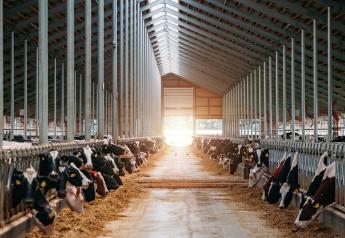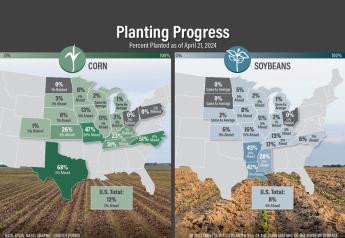Senate Immigration Plan Pairs Border Control with Citizenship Path

Schumer: "This is going to be a long, hard road," yet "we’re off to a good start."
April 16 (Bloomberg) -- Undocumented immigrants who pay at least $2,000 in fines and meet other criteria could become permanent U.S. residents and apply for citizenship after more than a decade if border security also is enhanced under a bipartisan Senate proposal.
President Barack Obama plans to meet today with Democratic Senator Charles Schumer of New York and Republican Senator John McCain of Arizona to discuss immigration, according to a White House official and a Senate aide. McCain and Schumer are part of a bipartisan group of senators releasing the plan today.
The measure, which seeks to balance a citizenship path that immigration advocates and many Democrats support with border security Republicans are demanding, is the product of months of closed-door negotiations among four Republican and four Democratic senators seeking the broadest rewrite of U.S. immigration law in almost three decades.
"This is going to be a long, hard road," Schumer said yesterday in an interview. "We’ve got a lot more travails to go through," he said, yet "we’re off to a good start."
Mustering the 60 votes needed to pass the plan in the Senate will be difficult, though Republican opposition to a citizenship path has waned since the November election, when President Barack Obama won 71 percent of the Hispanic votes cast.
House Republicans
An immigration-law rewrite faces longer odds in the Republican-controlled House, where pockets of strong opposition remain. Since the last major immigration proposal was passed in 1986, lawmakers have tried -- and failed -- several times to revamp U.S. immigration policy, most recently in 2007.
The senators, who planned to formally unveil the proposal today, decided to delay a news conference at least until tomorrow after bombings yesterday near the finish line of the Boston Marathon. Still they are making the details public today.
The senators’ plan allows immigrants who entered the country illegally before Dec. 31, 2011, pass a criminal background check and pay back taxes and a fine to apply for a provisional status. After 10 years and more fines, people with provisional status would be eligible to apply for a green card if they’ve learned English and maintained regular employment in the U.S., according to a 17-page summary of the proposal.
‘Not Amnesty’
In a round of Sunday talk show appearances April 14, Florida Senator Marco Rubio, a Republican member of the group, sought to differentiate the proposal from the 1986 rewrite, which made 3 million undocumented workers eligible for legal status. Rubio said the citizenship path the group is proposing will be a more difficult route than regular legal channels.
"It’s not amnesty because you pay serious consequences for having violated the law," Rubio said on NBC’s "Meet the Press." "If someone believes we can round them up and deport them, they should advocate that. I don’t think that’s a reasonable goal."
At Republicans’ insistence, the proposal mandates that border security must be improved before undocumented immigrants already in the U.S. can start down a citizenship path. Before immigrants can obtain provisional status, the Department of Homeland Security must submit to Congress a plan for securing high-risk sectors along the U.S.-Mexico border as well as a separate plan for improving fencing and other infrastructure.
Those plans must be implemented, an electronic verification system for employers to determine whether a prospective employee is authorized to work in the U.S. must be deployed and an electronic entry-exit system must be established at U.S. ports of entry before any undocumented person can apply for a green card.
13 Years
On average, it would take about 13 years for immigrants to obtain citizenship under the Senate plan, according to a person familiar with the proposal. The plan would establish a shorter process for obtaining citizenship for some agricultural workers and people who came to the country illegally as children and attend college or served in the military.
The plan for securing the border must, within five years, result in an apprehension rate of at least 90 percent in "high- risk" border sectors where more than 30,000 people are apprehended a year. If the apprehension rate isn’t met in those sectors within five years, the proposal would establish a commission of border-state officials and border-security experts to recommend ways to achieve the 90 percent goal.
The bill would provide $3 billion for implementing border security enhancements, including more Border Patrol agents and unmanned aerial drones.
Religious Group
The PICO National Network, a group of religious organizations that supports a path to citizenship for undocumented immigrants, criticized the legislative proposal in a statement today.
The measure places "unnecessary obstacles and delays in the path to citizenship and could unfairly exclude some of the 11 million aspiring Americans," Bishop Ricardo McClin, pastor of the Church of God Restoration in Kissimmee, Florida, said in the statement.
Staff continued drafting the bill yesterday, and members of the Senate group spoke by phone April 14 to finalize details of the proposal, said a person familiar with the talks who requested anonymity because the call was not publicly disclosed. Republican members of the Senate group briefed a larger group of their party’s senators on the plan last night.
Almost two-thirds of Americans, 64 percent, support a citizenship path for the undocumented, according to a Wall Street Journal/NBC News poll conducted April 5-8.
Republican Opposition
Still, some Republican senators remain opposed.
"I’m prepared to discuss what we can do to deal compassionately with people who have been here a long time, but I do not believe we should give every single benefit -- ever again -- to a person who has entered the country illegally," said Senator Jeff Sessions, an Alabama Republican who has emerged as a chief opponent of the Senate plan.
The plan would face more difficulty in the Republican-led House. Representative Lamar Smith, a Texas Republican, said yesterday in a statement that the Senate proposal was "fatally flawed" because it "legalizes almost everyone in the country illegally, also known as amnesty, before it secures the border."
"The Senate proposal issues an open invitation to enter the country illegally," Smith said. "Millions more will do so before the border is secure. The Senate proposal will dramatically increase illegal immigration."
Citizens’ Siblings
The Senate plan includes revisions to several categories of visas. It eliminates the availability of visas to siblings of U.S. citizens, establishes a visa program for prospective entrepreneurs and creates a merit-based visa category under which 120,000 to 250,000 visas a year would be allocated, the actual amount depending on a formula based on demand and the unemployment rate.
The proposal would increase to 110,000 from 65,000 the cap on visas available to workers in high-skilled fields such as mathematics, engineering and biotechnology. In future years, the cap could increase to 180,000.
In a provision that could draw criticism from companies that employ high-skilled foreign workers, the Senate proposal requires employers to pay higher wages to foreign workers with this category of visas than current law requires.
Lower-Skilled Visas
The plan would create a visa category for foreign workers in low-skilled fields including construction, janitorial services and hospitality. That aspect of the proposal represents the results of an accord struck last month between the AFL-CIO, the nation’s largest labor federation, and the U.S. Chamber of Commerce, the biggest business lobbying group.
It also would create a Bureau of Immigration and Labor Market Research to use labor market and demographic information to identify labor shortages and help set an annual visa cap.
The number of visas under the program would be capped at 20,000 in the first year and increase to maximum of 75,000 in the fourth year with the annual cap after that determined by a formula that takes into account the unemployment rate and other economic factors. The number of construction industry visas would be capped at 15,000 a year, satisfying an AFL-CIO demand.
The plan also revamps a program of visas for farmworkers negotiated between growers and the workers’ union, providing a separate process for agricultural workers to gain permanent legal residency after paying a fine. It would include visas for at-will employment and visas for contract-based employment.
Senate Hearing
Senate Judiciary Chairman Patrick Leahy said yesterday that the panel will hold its first hearing on the proposal April 22 and that Homeland Security Secretary Janet Napolitano will testify before the panel April 19.
Leahy, a Vermont Democrat, said in a statement that he looked forward "to reviewing the bill, holding prompt hearings on the legislation, and proceeding to debating and marking up legislation on this important issue." Last month, he criticized the Senate group for not yet producing a bill.
Rubio called Leahy’s announcement an "encouraging development," adding, "as we go forward in this immigration debate, we need more openness and transparency that I firmly believe will only help improve this bill."
Meanwhile, a bipartisan group in the House has been crafting a separate immigration proposal, which it could unveil later this month. That plan would include a path to citizenship of at least 15 years for many undocumented immigrants in the U.S., according to a congressional aide familiar with it.
Probationary Period
Under the House plan, undocumented immigrants would have a probationary period of two to five years and would have to wait in line behind those seeking to live in the U.S. legally, according to the aide, who asked not to be identified because the plan has not been finalized.
As with the Senate plan, the probationary period would include penalties, such as fines, back taxes and fees to cover the adjudication process. The immigrants would receive work permits and, after about 10 years, would be able to get a green card, according to the aide.
As has been the practice of their Senate counterparts, House negotiators have provided few details.
"We’ve made a promise to each other we would not go into the details until we’re ready to launch our bill, but we will have a bill and we’ll have one soon," Representative John Carter, a Texas Republican and member of the House group, said yesterday on MSNBC.







